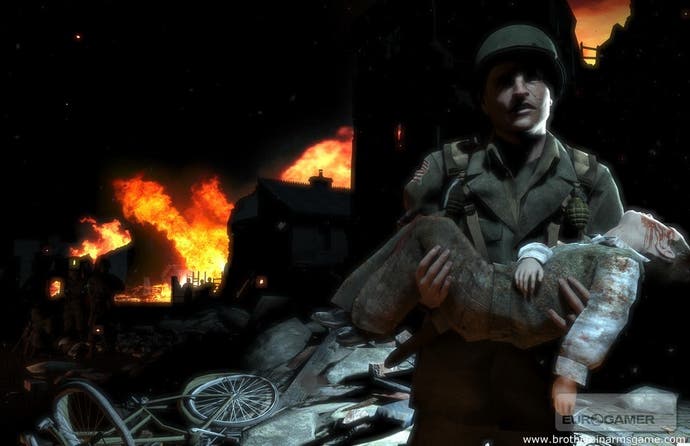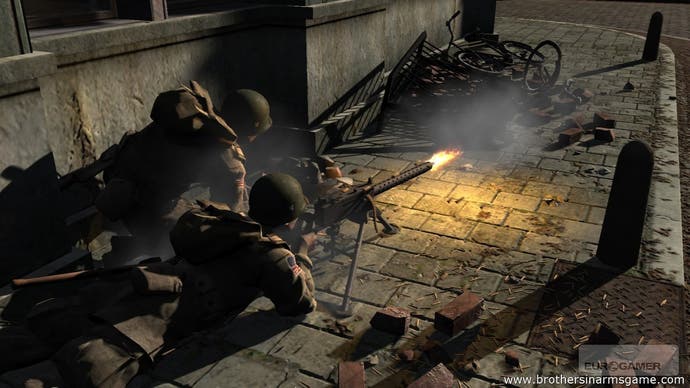Brothers in Arms: Hell's Highway
Oh no - this is the road to hell.
Eagle-eyed readers will recall that only a couple of weeks ago, we ran a delectable news tit-bit in which Gearbox boss Randy Pitchford opined that, despite the departure of Call of Duty for pastures modern, there's plenty of meat left on the bones of World War II videogaming yet. Some of you agreed, and leapt to the defence of the WW2 games; others did that rude thing where you yawn loudly behind your hands.
Well, unlike the rest of us - comment thread posters and journalists alike, frankly - Pitchford is in the unenviable position occupied by many game developers. We can say what we like and then disappear into the night; he, on the other hand, has to put his money where his mouth is. If he says WW2 games still have legs, then his next effort in that genre had damn well better show off a fine pair of pins.
Not that the Brothers in Arms franchise hasn't already been demonstrating well-formed calves and thighs for some time, of course. Hell's Highway is the third iteration in a franchise that has been pressing exactly the right buttons for some time - the previous game, Earned In Blood, picked up a creditable 8/10 on this very site, while the first title, Road to Hill 30, reached the dizzying heights of 9/10.
Get the Band Back Together
As soon as we sit down with Hell's Highway, it's clear that this is a game which hasn't lost any of the things which endeared Brothers In Arms to us in the first place. It's not just that it's more tactical, considered and intelligent than its run-and-gun rivals, either. Brothers In Arms takes an approach to World War II that is almost entirely different from that which is found in Call of Duty or Medal of Honor, and which - in our humble view - more than justifies Pitchford's claims about the WW2 scenario.

Each Brothers In Arms game focuses in on one small unit of American paratroopers, led by the player's character - in this case Matt Baker, the leader of the unit. Unlike other WW2 games - which essentially give a "survey" of the whole war, dropping in on key moments here and there - BIA chooses a single engagement and sets the game out over the course of that engagement. It builds its plot around well-developed characters within your unit, and the character of Baker himself, as they move through real, painstakingly researched events from the war.
It's a great approach to wartime storytelling - one which films have been exploiting for years, of course, and the heavy influence of Saving Private Ryan and its ilk are obvious in Brothers In Arms. This third game follows on directly from its prequels, which dealt in turn with one of the small but vital battles around D-Day, and with the tortuous fighting through the fields and villages of Normandy.
Turning the heat up a little, Baker's unit is now involved in Operation Market Garden - a bold Allied plan involving driving a tank brigade along 65 miles of Highway 69 (nicknamed Hell's Highway) in the occupied Netherlands, supported by paratrooper drops along the way. It was the single largest airborne invasion in history; if it had worked, it could have ended the war by Christmas 1944. Instead, it became the last major German victory of the conflict.
That's the dramatic backdrop for Hell's Highway - and Gearbox is taking its backdrop very, very seriously. Pitchford compares the amount the developer has spent on research and historical accuracy to James Cameron's obsessive approach to recreating the Titanic - and jokes that if you learned the maps in Hell's Highway, you could "move to Holland and become a tour guide". Not only are the places and the battles real; all characters ranked Lieutenant and up are real, historical figures, with only those ranked Sergeant and below being fictional, for the purposes of storytelling.
Blood Brothers

For those new to the Brothers In Arms series, the game works a bit like a normal first-person shooter. A bit. However, you play not a gung-ho grunt, but the commander of a small unit - and as such, your role has as much to do with ordering your team around as it does actually shooting the enemy. This is accomplished through a simple and inspired interface - you just select the squad you want to command, then hold down the left trigger and point your crosshairs at the thing you want them to do. Point at a piece of ground, and they'll go there and dig in; point at an enemy unit, and they'll start shooting in that direction. Simple.
Things get more complex, though, when you take into account the other concepts Brothers In Arms brings to the table. For a start, there are the little red dials over the heads of enemies, which indicate how "suppressed" they are. This isn't a measure of their willingness to come out to their squad-mates; rather, it's a measure of their willingness to pop their heads up and shoot at you. Send covering fire in the direction of enemies and they'll huddle away from the danger, allowing you to advance on their position, flank them while they're pinned down, and dispose of them.
This has been the basic formula of Brothers In Arms from the outset - it's all about setting up your teams so that they keep the enemy pinned down, then finding a way to get around to an exposed flank and give a taste of lead. In Hell's Highway, though, enemies demonstrate intelligent behaviour in response to your actions. Playing through the very first major mission, as we cleared out a farmyard and its outbuildings, we spotted enemies anticipating our flanking, and scurrying out for more advantageous positions when threatened, even under heavy fire.
They act, in other words, like real soldiers. They won't charge at you screaming in German, or stick their heads up while your machine gun is filling the ear with whizzing bullets; instead, they'll take cover intelligently, and do their best not to get killed. Combined with your own responsibility for the squad, and the fact that bullets kill you properly (no picking up health packs and suddenly feeling like Superman again), it makes for a tense, exciting experience.


.png?width=291&height=164&fit=crop&quality=80&format=jpg&auto=webp)




.jpg?width=291&height=164&fit=crop&quality=80&format=jpg&auto=webp)
